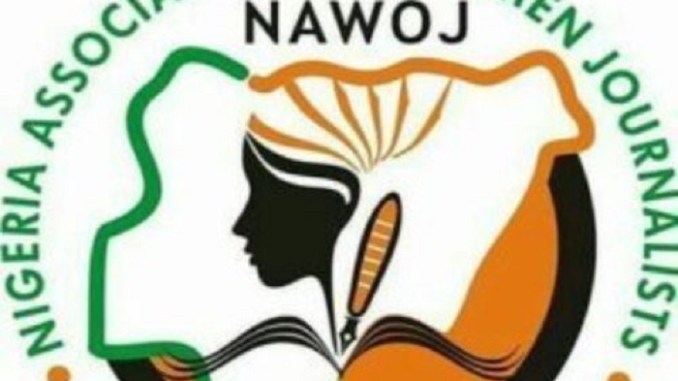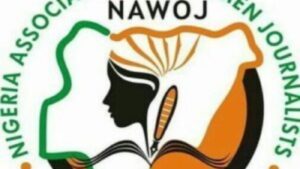
NAWOJ trains journalists on gender reporting
- Gender
- No Comment
- 258

Nigeria Association of Women Journalists (NAWOJ) has organised a media training for more than 50 journalists on gender-sensitive reporting.
The one-day intensive training which took place in Abuja, was sponsored by the Global Affairs Canada and facilitated by Action Aid Nigeria under the Women Voice and Leadership Project.
The theme of programme was ‘Bridging the Gap in Gender-Based Reporting.’
In his address, National President, Nigerian Union of Journalists (NUJ), Chris Isiguzo, regretted that women seldom get positive media visibility compared to the men.
Isiguzo encouraged women to flaunt their achievements against all odds, instead of playing second fiddle in the political, social, cultural and economic space.
“It appears most men are enjoying media visibility more than women. We almost tried as much as possible to allay the fears of women and throw a challenge to them because no matter how delicious your wares are, no matter how delicious your meals are, no matter how inviting your goods are, if you don’t say ‘this is where you are’, nobody will know that you are there.
“A situation where we try to shy away from expressing ourselves, giving ourselves voices, remains a major drawback to women. It’s not just about highlighting the issues.
“I think the time has come for us to begin to highlight solutions. The time has come for us to come up with strategies on how to address this challenge we face.
“The issue we keep talking about is the stereotypes, the issues we keep talking about gender-based violence, the issues we keep talking about cultural challenges that we face. But what have we done to begin to address these issues? The solutions are in your hands.
“It is left for you to take it up and begin to address them. Like I said, I aligned myself with someone’s opinion there.
“The issue of consistency; we are not going to allow somebody to do it for us. If we are good at what we do, everybody will come to us.
“Within the media environment, we have a good number of women that can excel, they are excelling, they are doing well in the industry.
“The newsroom is likely male-dominated, but the number of women we have, they are doing very well for themselves. We cannot continue to report our difficulties. Difficulties are drawbacks, are lay backs.
“We must begin to see and discover how the men are succeeding. For instance, within the political landscape, women find it difficult to express themselves. We have women that are seen, but they are hardly there.
“Nobody reads about them because they are reporting from an emotionally challenged point of view where they are playing up the fact that we are women. You should be able to stand side by side with the men depending on what you have to offer.
“If they are asking you what you bring to the table, they come to the table yourself. Yes, let people now see what you are.
“We cannot continue to lament. We cannot continue to be magnifying these issues. Rather, we must be looking at solutions.”
Also, NUJ Chairman, Federal Capital Territory (FCT), Patrick Osadebamwen, charged journalists to be deliberate in championing the course of women, especially those without the wherewithal to fend for them themselves.
“Reporters of gender-based issues, and this is important because in everyday of our lives, we live with the distracted place of a woman.
“However, we seem to take her presence for granted. But the reality is that it is tasking and very challenging. A woman goes to work with her husband, team, gets ready for work, he drives them to the office.
“When they return back in the evening, she rushes and takes care of the family. People like this need even special mention in your reports.
“When you do report about them, you don’t just see a female person who is out there working.
“You are seeing a female person who is endowed with so much and is divergent, very complimenting role that makes her unique in her contribution to society.
“And so, when you hear the campaign of inclusion, it is to have a deep understanding of this unique creature of humankind and how she has been able to stabilize the society.
“So, training like this gives you the skill set to be able to know that yes, it is a woman here, but beside this, there are other features that have made her to be this capable to meet up with these challenges,” he said.
The Vice President, Zone D, Chibzoba Ogbeche, explained that the event was organised to commemorate this year’s International Women’s Day.
According to her, women struggle with inclusion and equity, which should not be so.
Represented by the National Chairperson, NAWOJ, Aisha Ibrahim, Ogbeche said: “In Africa, generally, and in Nigeria, in particular, women have continued to struggle with the issues of inclusion and equity, among others.
“So, NAWOJ, which is an umbrella body of female journalists, as part of the celebration of the 2024 International Women’s Day, aims to train our colleagues on how to bridge the gaps in gender reporting.
“There is obviously a gap; we are not reaching where we are supposed to be. Like I said earlier, in our reportage, we are supposed to bring up more issues relating to women, be gender-sensitive in our reporting, and talk about aggregating our reports to show the number of women who are benefiting, not just the victims.
“Most times, you find out that women are in the news as victims, whether it is rape or domestic issues.
“There are other things women are doing that we need to highlight to raise their voices, so that people will know that women can do it.
“So, this training is basically to sensitize us on the need to take care in our reports and also bear in mind that every report we do is data for somebody.
“We should not just do it because we’re reporting; we should bear in mind that we are providing information, educating people, and providing data for researches.”
Moreso, the Facilitator, Head of Programme, Independent Television, Francisca Ogar, who spoke on the modus operandi in the newsroom, she said: “Many times when we go out on the field, we are very worried; we have deadlines to meet, and that has blinded us to the fact that we are excluding, in our reports, all the news sources.
“Just 25% are women, and even when we take women as sources, what do we take them for? Vox pops, popular opinion, eyewitnesses, or victims.
“This does not project women the way they should be projected. The whole essence is to bring about a change in mindset, to bring about a new face where journalists, as they go out in their daily reportage, consciously seek out the voices of women because women make up more than half of society.
“When we refuse to include them in our news, we don’t give them enough opportunity to speak out.
“We are shutting down a voice, not just a voice, but a very significant voice and opinion that matters and would have made a difference.
“The whole idea is to amplify the inclusion of women in our journalistic reporting.”
By Okwe Obi
https://sunnewsonline.com/nawoj-trains-journalists-on-gender-reporting/


